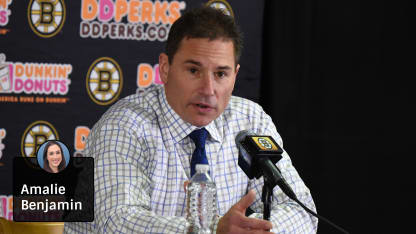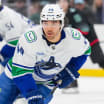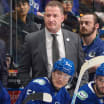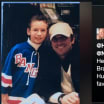BOSTON -- When asked about his interest in continuing as coach of the Boston Bruins on Sunday, Bruce Cassidy did not hesitate.
"Absolutely," he said. "One hundred percent."
The Bruins had just lost 3-2 in overtime to the Ottawa Senators in Game 6 of the Eastern Conference First Round, which ended their season.
Bruce Cassidy rewarded by Bruins
Will be retained as coach after leading Boston on late-season run to Stanley Cup Playoffs

Cassidy barely allowed the question to get out before he uttered those words, affirming his commitment to the Bruins. He wanted to be in Boston, a place that gave him a second chance more than 13 years after he was fired from his first NHL coaching job.
The Bruins affirmed their commitment to him Wednesday, making official what everyone believed would happen and assumed should happen.
Boston went 18-8-1 under Cassidy, making the Stanley Cup Playoffs for the first time since 2014, though the Bruins did not make it out of the first round. He replaced Claude Julien, the Bruins' coach for a decade, who was fired on Feb. 7.
Midseason coaching changes aren't always easy transitions. But Cassidy made it rather seamless, earning the trust of the players, some of whom had played for him during his five seasons as coach at Providence, the Bruins' American Hockey League affiliate.
"He did a heck of a job, and I think his results are what the coach should be judged on," forward David Backes said Tuesday. "He got us into the playoffs. We won a lot of games when he was behind the bench. That's not to say not everybody's got some reflecting to do and some growing to do -- coaches, players, staff, management, everybody included."
The coaching change woke the players up, let each of them know that business as usual -- and not making the playoffs for a third straight season -- was not acceptable. The system was tweaked. The players were pushed. Their goal was accomplished, even if they would have preferred to still be playing Tuesday, or at least awaiting Game 7 in Ottawa on Wednesday, instead of clearing out their lockers.
That last part was hardly Cassidy's fault; the Bruins were without three of their top four defenseman and their second-line center for much of the series against the Senators.
One thing that was clear when the players got ready to leave for the summer: They appreciated what Cassidy had done. They wanted him back, perhaps as much as he wanted to return.
"We obviously had some success with [Bruce] and it shows with the way that we played," defenseman Torey Krug said, the day before Cassidy's job was secured. "The guys were excited to play for him. I think the guys in this room would echo that same message and hopefully it does happen [that he is retained]. It's out of our hands, but the guys like playing for him."
Cassidy was able to jazz up an offense that did not score to its potential earlier in the season under Julien. Despite leading the NHL in shot attempts (SAT) percentage for much of the season, the Bruins weren't making the most of all that possession time. After Cassidy's arrival, the Bruins' power-play percentage was tied for second-best in the NHL with Buffalo Sabres at 27.8 percent; the Edmonton Oilers were No. 1 at 29.3 percent.
As center David Krejci said, "He gave us more life."
The defense also tightened; the Bruins allowed the fewest shots on goal (741).
"We wanted to make the playoffs … everyone here wanted to be in the playoffs, so I think we played a more aggressive game, and I think it ended up good for us at the end," forward Frank Vatrano said. "When you're playing more aggressive, you're not really playing on your heels, you're playing on your toes the whole time. It helps, and I think that's what we did down the stretch."
The numbers added up. Cassidy made sense in Boston. He had waited for years, bided his time in the AHL, when coach after coach was hired and fired and he remained in the minors. He got his first chance with the Washington Capitals at 37 years old in 2002.
He lasted 82 games that season and 28 the next.
His next chance would come 15 years later.
"I think it was a change that kind of woke everybody up a little bit, made us realize that we're capable of playing better," defenseman Adam McQuaid said. "We really came together as a group. We were more unified going down the stretch. [He] did a great job, too. We didn't change a whole, whole lot, but it was a good feeling in the room and a confidence that helped a lot."
That confidence, those changes, that wake-up call translated into results. They translated into more wins, into the playoff berth that management had been targeting for this season.
But all of that is in the short term. The question will be what Cassidy can do in the future, how he can integrate talented young players such as defenseman Charlie McAvoy and forwards Jakob Forsbacka Karlsson and Jake DeBrusk with the veteran core that won the Stanley Cup six years ago.
The players have faith in what he can do. Management does too.
It's now his team. It's his chance. He earned it.

















